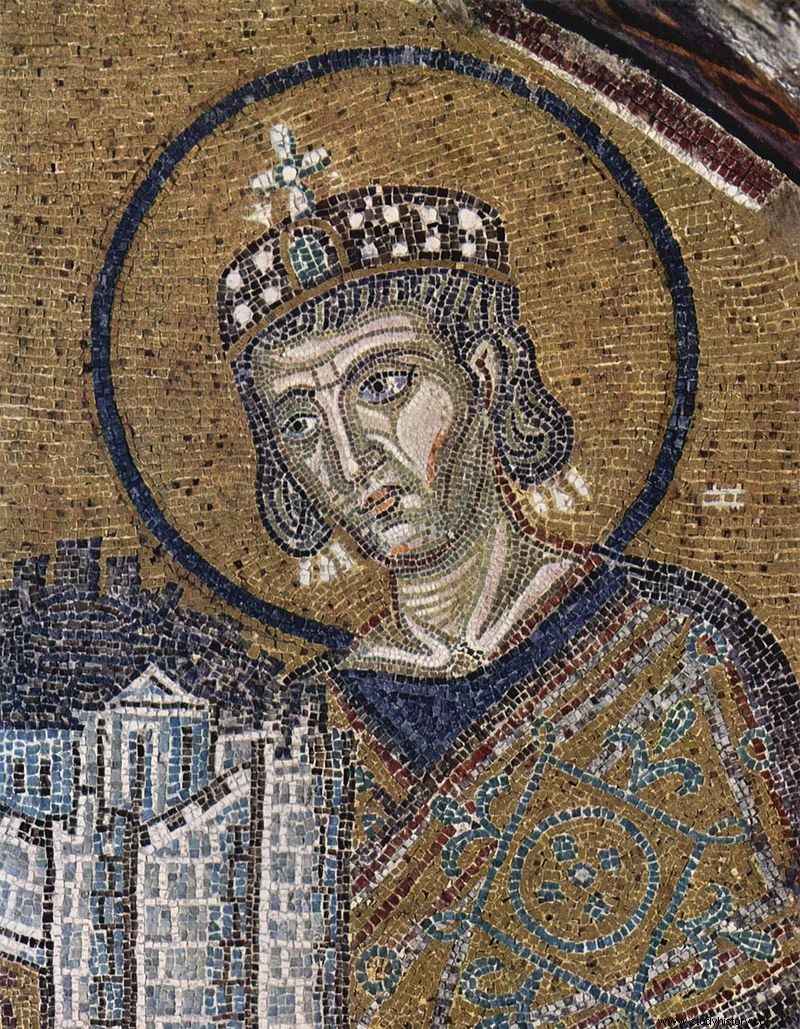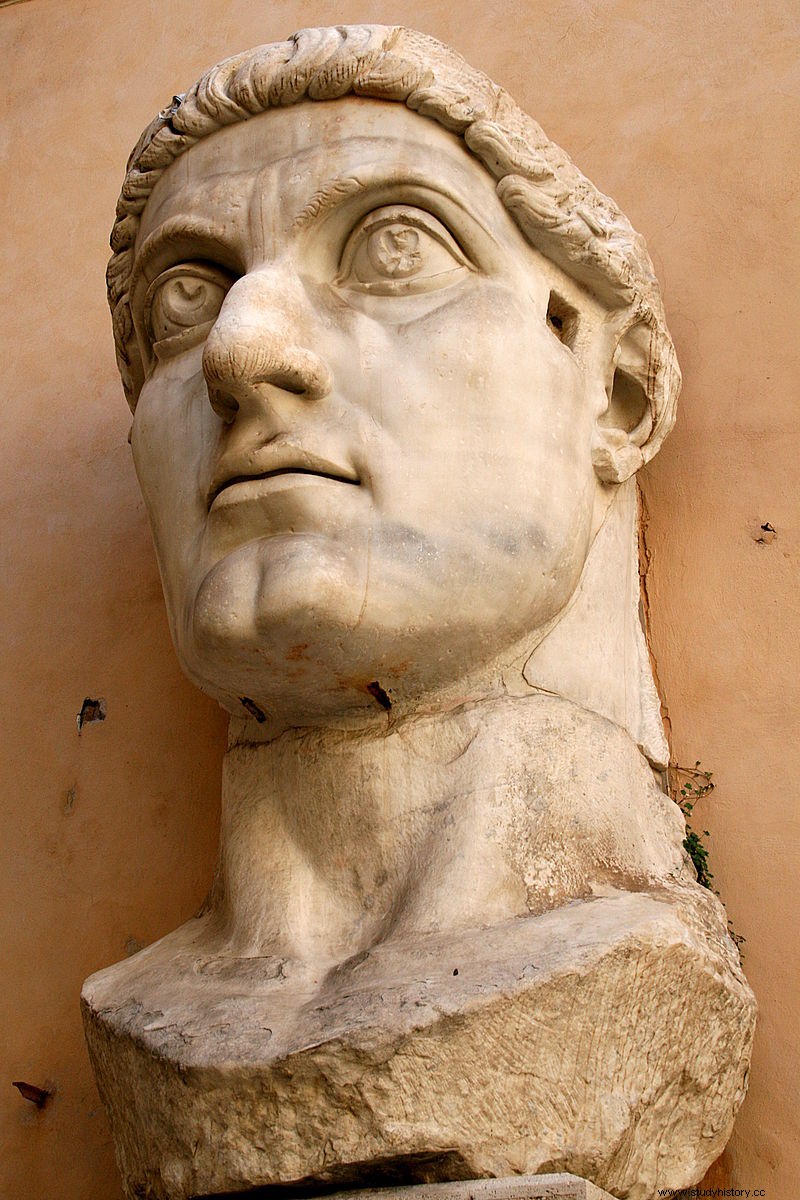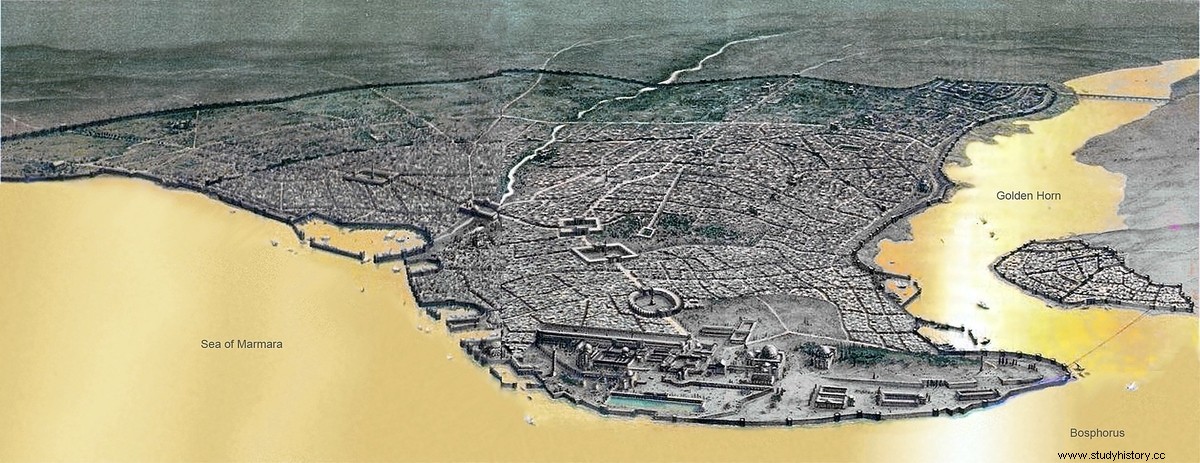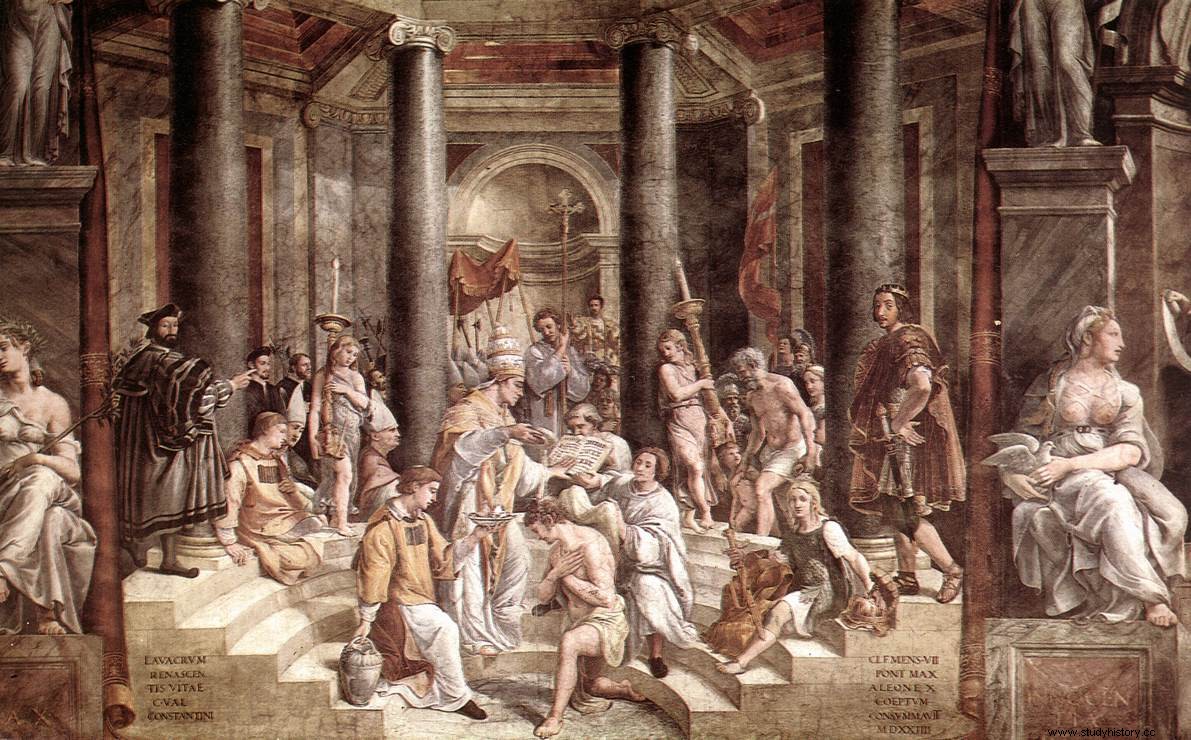
In terms of influencing the history of the world, Constantine would be among the five fingers.
After all, without Emperor Constantine, Christianity would not be dominant, there would be no Pope, and therefore no religious reform.
In later views of Christian history, Constantine was called the Holy Emperor, or Great Emperor.
But on the other hand, he is also regarded as the emperor who virtually ended Rome.
What is history when you think of Constantine? I can't help thinking.
With a Christian mother and a vice-emperor's father
Constantine's mother is said to have been an avid Christian.
Perhaps he had hidden it so cleverly that Diocletian, who repressed the Christians, did not know. Or she may have become a Christian because she was divorced by Diocletian.
Constantius Chlorus, the father of Constantius, was appointed as the western deputy emperor in Tetrarchy (four-headed politics), which began under Diocletian, and was divorced from his wife Helena and was the western emperor. He was married to Theodora, the daughter-in-law of Emperor Maximian.
Emperor Constantine himself served in the military with Diocletian in the east, not with his father Maximian, and when Diocletian and Maximian retired from the throne, his father became the western emperor. On that occasion, he heads for his father.
His father, Constantius, died of illness during his expedition to Britannia, and Constantine made himself an emperor and named himself.
This led Rome into an era of intense civil war.
Six emperors of the Roman Civil War

Hannibal Barca, the Carthaginian general who once afflicted Rome the most, said that the country that defeated the foreign enemies would soon start fighting in his own country, but that is exactly what Rome, who won the Punic Wars, began a civil war.
The civil war lasted for about 100 years, and Julius Caesar revived under the hero Octavian, creating an era called Pax Romana.
The peace lasted for about 200 years, but gradually the era of turmoil came, and at one point Rome was divided into three parts.
It was Emperor Aurelianus who brought it back to one, and Diocletian, who appeared after that, adopted Tetrarchy, who ruled Rome with four emperors under power.
However, after the retirement of Emperor Diocletian, Tetrarchy collapses in less than two years.
The turmoil that began with Constantine's sudden coronation spread to the capital, Rome.
The wrath of Roman citizens and the Roman Senate, who had been completely despised by Dominates, exploded, and was associated with a person named Maximian, who was a child of the Emperor Maximian but was not elected emperor himself. He became an emperor himself and declared his father Maximian to return to the emperor, resulting in an unusual situation in which six emperors lined up in Rome.
When this happens, there is no choice but to compete with each other. Human beings may be creatures that can only show their existence by making enemies.
The first to contend with Maximianus &Maxentius and Galerius in the east &Severus in the west. In this battle, Emperor Maximian was appointed, Severus died, and Licinius became the western emperor.
The camp of Emperor Maximian forms an alliance with Emperor Constantine, and Maximian's daughter Fausta and Constantine marry. By this time Constantine already had a wife named Minervina, so he was divorced and married. History repeats itself, but children tend to return what they have been parents to.
At this time, his brother-in-law, Maxentius, did not seem to have been invited to the wedding.
The role of the Roman emperor is Imperator (Supreme Military Commander), even during the civil war, to maintain domestic security. Emperor Constantine went to fight the Franks in the north, but his father-in-law, Maximian, sent troops to overthrow Constantine. It's unclear what Maximian was thinking at this time, but it's likely he was a cunning Constantine trap.
When Emperor Constantine quickly conquered the Franks, he defeated Maximian at the speed of a gale, and the emperor fled to Massilia, the current Marseille, but was presented to Constantine by the inhabitants.
Maximian then attempted to assassinate Constantine, but failed due to the fingertips of his daughter Fausta, and later became a man who never returned.
Constantine announced this as suicide, and it's unclear if people at the time believed it. And I don't know if there was an assassination plan in the first place. All we know is that Maximian is dead at this point.
Maximian's daughter Theodora was Constantine's mother-in-law, another daughter Fausta was Constantine's wife, and Maximian was his father-in-law and grandfather-in-law, but with little hesitation. Emperor Constantine is murdering.
Constantine has killed many relatives in his life, and this is probably the first time.
Emperor Constantine has a ruthless personality, killing those who oppose him mercilessly and without hesitation. He is afraid of rebellion by repeatedly slaughtering Germanic opponents as a show.
This is in contrast to Caesar, Rome's greatest hero, who responded to different ethnic groups with his forgiveness (Clementia).
Well, going back a bit, Licinius became the western emperor after Severus died, and this fact was dissatisfied not only with Maxentius but also with Maximinus Daza, the eastern deputy emperor. It's no wonder that he suddenly became a regular emperor, aside from himself as a deputy emperor.
Galerius, the eastern emperor, confirmed the inauguration of Dia's emperor, and he died of a serious illness.
Emperor Constantine marched to Rome on this occasion, and when he defeated Emperor Maxentius lightly, he met with Emperor Licinius in Milan. At this time he issued the famous Edict of Milan, recognizing religious freedom within Roman territory.
The Edict of Milan is a term that often appears in Japanese textbooks dominated by Christianity, and it often appears in center exams, etc., but it is no mistake that Christianity was officially recognized by this, but at this point. Then, he admitted the freedom of religion including Manichaeism, not only Christianity.
Furthermore, because it is a joint statement with Emperor Licinius, it is not only issued by Constantine.
Yamakawa's Glossary of World History states that "political measures to soften the growing number of believers", but the number of Christians at that time was estimated to be about 4% at most, and is that opinion valid? There is a question as to whether or not.
At this time, Constantine married his younger sister, Constantine, to Emperor Licinius.
After that, he won the battle with Maximias Dia, won the battle with Licinius as it was, succeeded in killing all the six emperors who should have been, and Constantine became the only Roman emperor on a sunny day. Was completed.
Emperor Constantine actually had fewer soldiers to lead than other emperors.
However, as some battles in ancient times have shown, it is possible for even a mercenary to defeat a superior enemy by training, commander's ability, and morale. It can be said that Constantine had all this, and his military talent was comparable to Sulla and Julius Caesar.
Constantinople Construction

Constantinople, the city that still remains as Istanbul, Turkey, was named after Emperor Constantine, as the name implies.
There have been several possible reasons for creating a new city since ancient times.
- I wanted a capital without a Senate
- I wanted a capital that would be glaring for both the Germanic people and Persia
- He wanted to create a new Christian-centered nation
Probably all this.
Many Roman emperors have been assassinated by the guards and the Senate. Given the murder of Julius Caesar, even if he wasn't the emperor, it's easy to see why he didn't want to return to Rome under his influence. If Constantine returned to Rome, he would have been assassinated.
The reason for relocating to the capital is often withdrawal from vested interests. If reforms were to be carried out in Japan, the capital function should be relocated to a place other than Tokyo. It is impossible to reform Kasumigaseki, where those with vested interests will be disappointed.
In terms of location, Rome was far from the enemy nations of Persia and the defensive lines of the Rhine and Donau rivers. No land would have been more suitable for the capital than Byzantium, which had a glare and excellent defense.
I think this is a judgment.
It is said that the new city, which was created with all the power, was completed in just six years from the start of construction.
In addition, it is known that there were many churches in Constantinople, and as a policy, when it came to Christian priests, tax incentives were given.
The Roman emperor is both Imperator (commander-in-chief) and Pontifex maximus, and is obliged to perform rituals for the Roman gods.
However, no one can resist Constantine, who became the only despot. The Senate would have complained if he was in Rome, but it is useless to say anything to the Roman emperor in the distant land of Asia Minor.
Constantine and Christianity
There have been various thoughts since ancient times as to why Constantine protected the Great Religion so far.
Perhaps he was a hidden Christian.
His mother is said to have been a devout Christian, suggesting that even his father, Constantius, may have been a Christian.
Emperor Diocletian would have appointed such a person, which is no wonder.
Christians rarely abandon their faith. Religion goes beyond the death of a person. There are many Christians who are willing to be martyrdom.
Or maybe because he was a realist and cunning Emperor Constantine, he intended to establish a Christian rule.
There used to be a person named Emperor Shomu who tried to rule the country by making a big Buddha in Japan. The idea is the same.
It can be said that religion, which is an identity that transcends language and ethnicity, was the most convenient tool for controlling Rome, a multi-ethnic nation.
So Constantine, despite being a Roman emperor, is holding a meeting in Nicaea, Asia Minor, for Christian doctrine.
The subject of this conference, which is described as the Council of Nicaea in history textbooks, is whether Jesus Christ is God or not.
Which is correct, Athanasius that Jesus is God or Arius that Jesus is human? Constantine admitted that Athanasius was right.
From that moment on, Jesus became God. The Roman emperor, the most powerful person in the world, made Jesus a god.
Arius was subsequently banished and decided to spread the teachings to the Germanic people.
As an aside, Anatasius's idea of Trinity that God, spirits, and Jesus are the same is the absolute teaching of Christianity today, and Christians say that Jesus is not God. What do you think about the theory? I heard that he had been very angry. It was a moment when he thought he would never know a Christian.
Later, the Eastern Church came to take the theory that the emperor was the Pope. The Pope and the Eastern Church will be excommunicated with each other, but this is another story.
Returning to Emperor Constantine, it would have been more convenient for Jesus to be God. It is convenient for the Roman emperor to represent God. The coronation of Napoleon and Charlemagne is held by the Pope. The Pope is the agent of Jesus, the God.
In fact, Constantine is called the Holy Emperor, the Great Emperor, etc. in the historical view that Christianity took control of, and has received the highest evaluation.
Furthermore, the disposition that even a forged sentence called "Constantine's donation letter" is made.
This is a donation letter stating that Constantine, the holy monarch, donated the Papal States to the Pope, which was used to authorize the Roman Church and later turned out to be a complete forgery. ..
Corruption of the church It is an incident that was said to be extremely rare here.
However, this text was later used as a basis for claiming the legitimacy of the Pope during the coronation of Karl, the Crusades, the Great Schism, etc., and it turned out to be a big lie. In the 18th century, all the parties were dead. It can be said that it is the biggest fraud case in history.
Bloody Constantine's family killing
There are various tyrants in world history, but no matter how tyrants they are, they don't kill their relatives very much.
Commodus and Nero are said to be tyrants because they killed their sister and mother, respectively. Nero has also been greatly disappointed in the slaughter of Christians. Nero wouldn't have expected the hated Christians to become the rulers of the world.
Even in China, Yang Guang and Tang Taizong have murdered their brothers and assumed the throne.
There are certainly people who have killed their relatives in this way, but none of them have killed their relatives more than Emperor Constantine.
First of all, as I mentioned earlier, he killed his father-in-law, Macrianus Major. There is no evidence, but it is reasonable to assume that Constantine was killed. He also killed his brother-in-law, Maxentius. There is no particular justification for this killing. I guess I killed him because it was an obstacle. You probably thought it went well because you took part in the battle. Even if I survived, I don't think Maxentius lived for a long time.
He then executed the child crisps he had with his divorced wife. His charge seems to have been an affair with his Empress Fausta, but he has not punished him. Since Crisps was an excellent general, it is reasonable to think that he killed him for protection.
I also killed the empress. It seems that this was trapped in a sauna and killed. There is no evidence, but it is unlikely that anyone other than Constantine was the culprit.
There is no evidence about half. But it is certain that he killed his true son, who had a blood connection with his father-in-law.
Late years and the end

When the country was unified, Emperor Constantine went to the battle with the Germanic people in the north, defeated the Armanni, Sarmatians, the strongest Germanic Goths, etc. We will meet in Nicopolis, the capital of Emperor Diocletian.
He was baptized at the end of his life and officially became a Christian and died.
I can't be sure now whether this is a fake or true.
After the death of Constantine, a battle for bones and flesh developed over the throne, and a lot of blood was spilled again.
Personal evaluation of Constantine
No one in world history is so difficult to evaluate.
The evaluation of Emperor Constantine will be the evaluation of the "medieval" era.
With the coronation of Emperor Constantine, Romanity died completely. The republic died, and the very best of Rome, such as Yupiteru, died in effect. What comes after this is the "medieval" era, which is dominated by Christian doctrine.
In the world, this era is also known as " Dark Ages . Is called.
The Dark Ages will clear up during the Renaissance, when Roman culture begins to be reviewed. From that point of view, the evaluation of Emperor Constantine, who was the one who entered the dark ages, would be significantly reduced.
On the other hand, for Christians who consider the Middle Ages to be an ideal era, they will be the best masters and emperors who have no more existence.
When I think of Emperor Constantine, I always feel that history is an evaluation that stands at the present time.
Personal evaluation of Constantine is the highest grade as a warrior.
As you can see, Constantine is undefeated for a lifetime.
Moreover, his enemy was also strong.
Sulla, who was so strong, easily won, no matter how disadvantaged he was when his enemy was non-Roman, but he struggled when his enemy became the same Latin or Roman.
However, Emperor Constantine has also defeated troops such as Emperor McClearus, who was commanded by the same Romans and used horribly, and has also won a great victory over the particularly strong Franks and Goths among the powerful Germanic peoples, and it is definitely the world. It can be said that it is one of the strongest in history.
Even in domestic affairs, there was no major rebellion during the time of Emperor Constantine, and security was significantly improved. He has also succeeded in the huge public works project of building Constantinople, which can be said to have produced top-notch results in military, diplomatic and domestic affairs.
Personally, the image of Christians is not so good, and there are also points such as family killing, but overall it can be said that he is a first-class master in world history.
Certainly, I think there is something that can only be called Constantine the Great.
